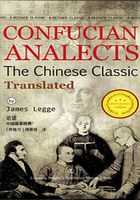
CHAPTER 5
1. Măng E asked what filial piety was. The Master said, "It is not being disobedient."
2. Soon after, as Fan Ch'e was driving him, the Master told him, saying, 'Măng-sun asked me what filial piety was, and I answered him,—'not being disobedient.'
3. Fan Ch'e said, "What did you mean?" The Master replied, "That parents, when alive, should be served according to propriety; that, when dead, they should be buried according to propriety; and that they should be sacrificed to according to propriety."
5. FILIAL PIETY MUST BE SHOWN ACCORDING TO THE RULES OF PROPRIETY. 1. Mang E was a great officer of the state of Loo, by name Ho-ke(何忌), and the chief of one of the three great families by which in the time of Conf. the authority of that state was grasped. Those families were descended from three brothers, the sons by a concubine of the duke Hwan (B.C. 710-693), who were distinguished at first by the prenomens of 仲, 叔, and 季. To these was subsequently added the character 孙, 'grandson', to indicate their princely descent, and 仲孙, 叔孙, and 季孙, became the respective surnames of the families. 仲孙 was changed into 孟孙, by the father of Mang E, on a principle of humility, as he thereby only claimed to be the eldest of the inferior sons or their representatives, and avoided the presumption of seeming to be a younger full brother of the reigning duke. 懿, 'mild and virtuous', was the posthumous honorary title given to Ho-ke. On 子, see I.1.1. Fan, by name 须, and designated 子迟, was a minor disciple of the sage. Conf. repeated his remark to Fan, that he might report the explanation of it to his friend Mang E, or Mang-sun, and thus prevent him from supposing that all the sage intended was disobedience to parents.
